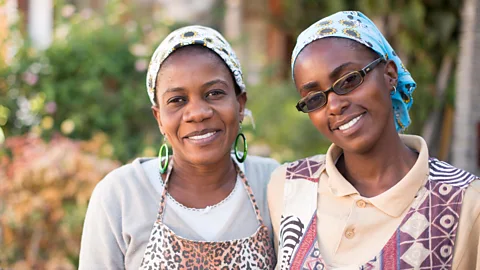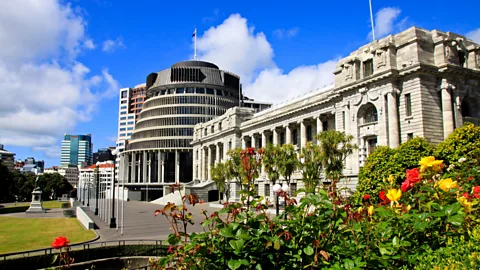The world's most gender-equal countries
 Chad Case/Alamy
Chad Case/AlamyBBC Travel talks to residents in four of the best-rated nations to find out what it's really like to live there.
How is the world doing on gender equality? According to the World Economic Forum (WEF), the picture is mixed. The needle is moving in the right direction, according to its latest Global Gender Gap report, but incrementally. At the current rate of progress, the report finds, it will take 131 years to reach full parity between women and men (the report does not take into account non-binary or other identities). And no country has yet achieved full gender equality.
While countries in Europe and North America tend to do better than the rest of the world, there is plenty of variation. The United States, for example, ranks 43rd, with the gender gap less than 75% closed, behind countries including Colombia, Belarus, Liberia and Cabo Verde. Australia (77.8%) ranked 26th, between Mozambique and Chile, and Canada (77%) ranked 30th, between Slovenia and Barbados.
The report weighs aspects like women's economic participation (including the gender gaps in income, employment and leadership roles), educational attainment (with measures like literacy rates and educational enrolment), health and survival (such as life expectancy) and political empowerment (female representation in parliament, ministerial positions and years with a male or female head of state).
Based on this data, which places perform the best – and what do women say it's really like to live there? BBC Travel talks to residents and expats in four of the top-ranked nations to better understand what it's like to travel in or move to these countries.
 Jordan Siemens/Getty Images
Jordan Siemens/Getty ImagesIceland
For the 14th year in a row, Iceland takes the top position in the WEF rankings, with it gender gap estimated to be 91.2% closed. It is the only country to have closed more than 90% of its gap.
Top 10 countries in the 2023 Global Gender Gap report:
But the rosy picture depends on what, exactly, you look at. In the WEF report, Iceland ranks first in terms of political empowerment, thanks to the fact that nearly 25 of the last 50 years have seen a female head of state and that 48% of its parliament members are female, for example. But it comes in 79th in educational attainment and 128th for female health and survival.
Even on measurements where Iceland performs well, such as the wage gap, the day-to-day picture is more complicated, says Hulda Tolgyes, a psychologist from Iceland. Iceland's wage gap between genders is smaller than most other countries, partly thanks to 2018 legislation declaring that companies with more than 25 employees must provide equal pay for equal work (or risk daily fines). Yet Tolgyes says she regularly is offered a lower amount of money for speaking fees than her husband, even when they're offered by the same company – such a common occurrence that she believes it must be sexism at play.
"It's very frustrating for me as a feminist to see how things really are around here," she said. "We had a female president. We have a female prime minister. But what I see is tired and burnt-out women who are told they can do it all."
Still, Icelandic women say, there is a lot to appreciate. The country's First Lady Eliza Reid, a Canadian emigrant to Iceland who wrote the book Secrets of the Sprakkar: Iceland's Extraordinary Women and How They Are Changing the World, has remarked that her daughter has her surname, not her father's, and that her husband took several months of paternity leave for each of their children, for example. Along with Tolgyes, she agrees that the country has a long way to go – it isn't a "gender paradise". Still, she writes, it is a "society where women are treated on par with men, or, at least, the intention to do so exists".
For people of all genders, there are other benefits to Icelandic living, too: among other things, it's been ranked as one of the world's happiest countries and the most peaceful.
 Jordan Siemens/Getty Images
Jordan Siemens/Getty ImagesNorway
Norway ranks second in the WEF's 2023 rankings, with a global gender gap estimated to be 87.9% closed. It also ranked first in the 2021 Women Peace and Security Index.
The high performance isn't surprising, says Thea Ringseth, a Norwegian native who has lived in various parts of the country, including Oslo and Trondheim. "Gender equality is quite visible in Norway," she explained. "There are a lot more women in positions where they usually used to be men, like our prime minister, who for the last eight years was female, and there are a lot of female leaders in government and other key positions." In particular, Norway has more women represented in ministry positions than any other country.
Outside politics, Norway performs particularly well in terms of female literacy (it ranks first), the number of female professional and technical workers (also first) and income parity (ranking sixth).
Of course, Norway hasn't reached 100% gender equality – and that's still shown in societal attitudes. "It's expected that if your child is sick, for instance, it's usually the mother that stays home," said Ringseth. "But these things aren't, I think, especially Norwegian."
Meanwhile, there's a focus on freedom and empowerment for all Norwegian citizens that Ringseth holds dear. "As a society, it isn't frowned upon to further your needs, your education, your career, your social, economic needs [as a woman]", she said. "Being driven, career-oriented, ambitious – it is seen as something that is positive."
 New Zealand Transition/Getty Images
New Zealand Transition/Getty ImagesNew Zealand
New Zealand comes in fourth on the WEF report overall, making it the top performer in the Southern Hemisphere. It does particularly well in terms of political representation, with 50% of its parliament members female, while female enrolment in primary and secondary education is nearly on par with male.
Jessica Vredenburg, a Canadian who has lived in New Zealand since 2016, is a marketing professor at Auckland University of Technology. "In my experience, at least in the business school, the gender split is really quite even," she said. "In our marketing department… we might even be more female-heavy than male. My dean is female. Most of my colleagues are female." She's not aware of ever having had less-than-equal career opportunities than her male counterparts.
Of course, like everywhere else, New Zealand is far from perfect. The WEF found that women earn an average $33,620 per year compared to $52,370 for men, for example, and in terms of wage equality for equal work, it ranks 37th. It also does relatively poorly for female life expectancy, at 109th in the world. The Indigenous Māori population is at particular risk, statistics show, with Māori women's life expectancy nearly seven years shorter than that of non-Māori women.
"My experience might be different for someone who has a Pacific Island or Māori background," Vredenburg said.
Gender equality aside, residents say there are many reasons to love living in New Zealand. The beauty of the landscape, from the mountains to the beaches, is one part. That it's small and easy to get around is another. Then there's the overall vibe. "It's very laid back, very easy-going, sort of chill. They really enjoy their sport and getting together – it's a friends-and-family, barbecue-and-gathering kind of culture that I quite enjoy," Vredenburg said.
 Keren Su/Alamy
Keren Su/AlamyNamibia
The only African country in the top 10, Namibia's gender gap is estimated to be 80.2% closed, putting it in eighth position. That means it bests many countries in other parts of the world, including the United Kingdom (15th, 79.2%), Spain (18th, 79.1%), Canada (30th, 77%) and the United States (43rd, 74.8%).
The country's ranking makes sense to Penohole Brock, a Namibian former gender sensitivity trainer who is now at the Ministry of International Relations and Cooperation. "A lot of our ministers are female. A lot of our ambassadors are female. And my work colleagues, I would say, do not face discrimination when it comes to career trajectory – it's been a very healthy work environment in that sense," she said.
Still, representation is only part of the equation. "Gender parity is a great step in the right direction. But now it's time to look at and analyse, 'Okay, but then what are these female voices advocating for?'," she said. In terms of gender-based violence and sexual harassment, "we still have quite a long way to go". The 2021 Women Peace and Security Index, for example, placed Namibia 95th, behind other African countries including Mauritius, Rwanda, South Africa and Ghana.
But Brock, who also has lived in both South Africa and Paris, says she wouldn't want to be anywhere else. "The people, the music, the energy – I love it. It's so diverse. Each region is so different," she said. "I see so much potential in Namibia. It's a wonderful place."
Living In is a series from BBC Travel that discovers what it’s like to reside in some of the world’s top destinations.
---
Join more than three million BBC Travel fans by liking us on Facebook, or follow us on Twitter and Instagram.
If you liked this story, sign up for the weekly bbc.com features newsletter called "The Essential List". A handpicked selection of stories from BBC Future, Culture, Worklife and Travel, delivered to your inbox every Friday.
